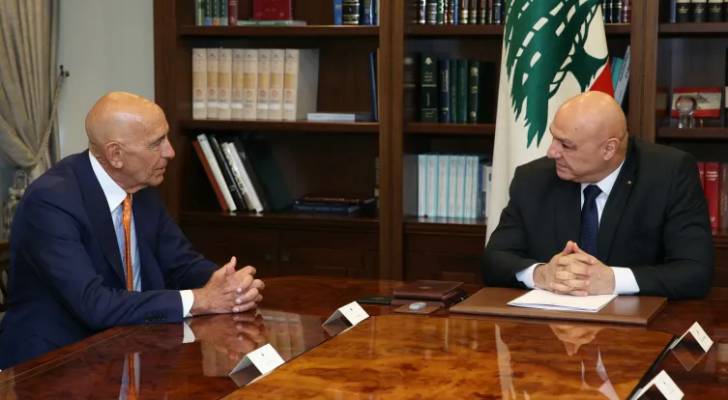Lebanon's President Joseph Aoun, right, met US envoy Thomas Barrack at the Baabda Presidential Palace in Beirut on July 7, 2025
The disarmament question: Lebanon's reply to US demands on Hezbollah
In Beirut on Monday, Lebanese President Joseph Aoun received American diplomat Thomas Barrack, who was handed the Lebanese state's reply to a United States proposal about disarming Hezbollah.
Barrack, the Ambassador to Turkiye and Special Envoy for Syria, described Lebanon's response as "something spectacular" and stated he was "unbelievably satisfied" by the reply, which has not yet been made public.
"What the government presented to us in a very short period was something amazing; I am extremely satisfied with the response," Barrack told reporters after he met with President Aoun.
The Lebanese President's team provided the American envoy with a seven-page response to the proposal submitted on June 19. Barrack noted that "Hezbollah is a political party, and it also has an armed side. Hezbollah needs to see that there is a future for them, and that this path is not meant to be against them only, and that there is an intersection between peace and prosperity for them too."
US proposal links disarmament to 'Israeli' withdrawal
The American envoy's proposals, delivered to Lebanese officials during his last visit on June 19, include the complete disarmament of Hezbollah within four months, in exchange for the withdrawal of Israeli forces still occupying several positions in southern Lebanon and a halt to 'Israeli' airstrikes. Lebanon had formed a committee to draft the response, amid expectations that the group had provided its feedback to its ally, Parliament Speaker Nabih Berri, to include in a counter-proposal prepared for Barrack's visit on Monday.
Unrevealed details of Lebanese response
While the Lebanese government's response has not yet been made public, reports indicate it demanded 'Israel' withdraw from all Lebanese territories, including five points it occupied during the recent ceasefire and areas it stayed in after the 2000 withdrawal from southern Lebanon. It also reportedly called on the US to pressure Israel to abide by the ceasefire, return Lebanese prisoners, and adhere to United Nations Security Council Resolution 1701, which calls for a cessation of hostilities, for Hezbollah to withdraw from south of the Litani River, and for financial and economic reforms, among other provisions. Barrack confirmed receiving a seven-page reply from Aoun’s team and stated he was satisfied, though he hadn't yet had time to study it.
Hezbollah affirms continued resistance, rejection of normalization
In a related development, Hezbollah's chief Naim Qassem affirmed on Sunday that the group will continue confronting the Israeli Occupation Forces in defense of Lebanon, declaring that the resistance "will not back down, even if the whole world tries to stop us." Qassem emphasized that the primary goal of the resistance is to maintain its momentum despite the difficult circumstances facing Lebanon and the region. He asserted that "adhering to the path of resistance is the only way to protect the country from aggression and foreign ambitions."
"We are ready for peace and the rebuilding of Lebanon," he added, "but at the same time, we are fully prepared for confrontation and defending our land and sovereignty whenever necessary." Qassem stressed that Hezbollah’s steadfast position stems from a firm belief that the enemy understands only the language of force and deterrence. He also stated that the group will not be part of any process that legitimizes the occupation in Lebanon and firmly rejects normalization with Israel.
Historical context, economic pressures
Historically, Hezbollah has filled the void left by the state, while at times undermining the state’s attempts to fill that void. Further pressure is on the country because it is badly in need of foreign investment and aid for reconstruction, which the US has signaled may be tied to disarming Hezbollah.
In this context, Hezbollah seems to agree with the Lebanese government and has expressed some willingness to cooperate, as it knows many of its supporters need their homes or villages liberated or rebuilt.




